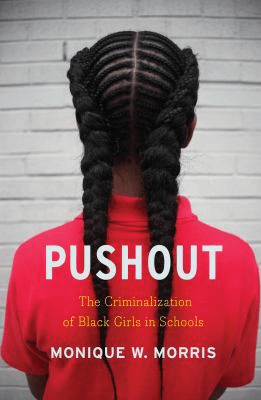In 2016, headlines were made when new census data revealed that Black women were statistically the most educated group of people in the United States, earning high-percentages of every level of degree, and enrolling in college at a higher percentage than any other group. Unfortunately, though, the state of the education world isn’t all good news; at the same time that Black women are outpacing others in the post-graduate arena, many young Black women are being left behind in public schools, marginalized by punitive and surveillance systems embedded into our education programs and into society at large. Black girls make up 16 percent of the public school population, but represent more than one-third of all girls with a school-related arrest.
The fact that both of these sets of circumstances can be true at the same time shows that there are no easy answers or quick fixes when it comes to correcting our institutions and creating educational justice for Black girls, and that’s exactly what Monique Morris examines in Pushout: The Criminalization of Black Girls in Schools.

Inspired in part by the fact that so much of the literature on the “school-to-prison pipeline” has a male-focus, Morris examines how policies, systems and social circumstances conspire to impact young Black women. The book provides an overview of the startling statistics, but also does a deep-dive into specific issues, including the normalization of heightened surveillance in communities of color, the criminlization of teen misbehavior, conscious and unconscious bias, sexualization, poverty, lack of needed support systems and the ways that education functions (and fails to function) within the juvenile justice system.
Alongside her examination, Morris includes interviews with Black girls who have been directly impacted by the failure of the systems her writing explores. These interviews give an important platform to Black girls whose voices are often left out of the conversation, including trans girls, commercially sexually trafficked girls and girls ensnared in the social welfare and juvenile justice systems.

Here in Pittsburgh, students involved in TeenBloc, (“a coalition of student leaders and organizers in Pittsburgh’s high schools whose purpose is to raise the student voice and create positive change in Pittsburgh Public Schools”) faced the issues raised in Pushout head-on by hosting community conversations and teach-ins aimed at raising awareness and creating a collaborative space where impacted students could co-create solutions. PublicSource covered TeenBloc’s actions and the actions of other local organizers who participated in the National Week of Action Against School Pushout in an article you can read here. Two TeenBloc participants, Ahmari and Kelis, agreed to share their perspectives on the topic with Eleventh Stack readers:
Why do you think this is an important issue?
“Black girls are pushed out of school every day and it’s something that needs to be addressed. There are Black girls in this country that are unable to receive an education because they were pushed out of school and there was nobody to help them.”
“I suffer everyday from the effects of pushout, and it shaped much of my childhood.”
Can you tell me a little bit about your teach-in program this fall? What inspired it and what topics did you cover?
“The campaign centered on Black girls this year was inspired by Monique Morris and her book. She visited the August Wilson Center last March, and TeenBloc students were so moved that this school year’s entire focus was shifted closer to the work that she was doing.”
“During our summer internship at TeenBloc a group of interns, all Black girls, worked on multiple tasks, one of which was creating the teach-in curriculum. The teach-in educates the participants on the implicit bias that Black women and girls face in schools and in society, and asks them to offer solutions.”
If you’ve read Pushout by Monique Morris, what was your opinion on the book? Are there any other similar books you’d recommend?
“I think every educator should have to read Pushout. It is important for teachers and professors to understand all of the different aspects that go into pushing Black girls out of their classrooms so they don’t continue pushing the Black girls in their classes out.”
“I was able to relate to a lot of narratives in the book. It was very comforting but also disheartening to know that I wasn’t a bad kid or the only person with my experiences. It also was interesting to see the wide range of personal narratives intertwined with the statistics.”
If readers of this blog post are interested in this topic, what is one action they can take to support black girls?
“Work on your implicit bias. Support Black women and girls. Get involved at your school/your children’s school and ensure that no unjust policies are enacted/in effect there.”
-Ginny
Learn about the criminalization of black girls in schools
Read PushoutGinny is a baker of treats, reader of fiction and Coordinator of Volunteer Services based out of the Office of Programs and Partnerships at CLP – East Liberty. She wants to pet your dog.

